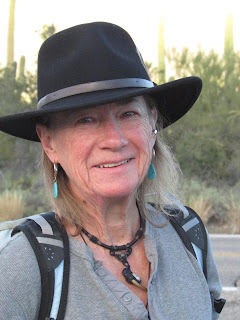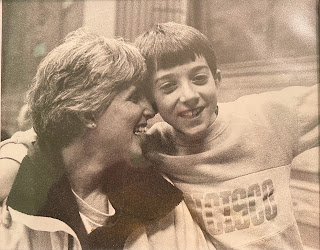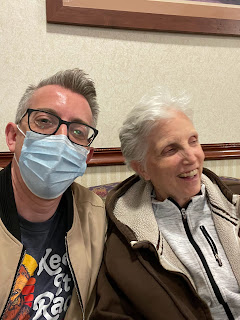Last Friday I learned that my friend Alison had passed away earlier that morning. She was diagnosed with cancer just the week before and then she gone. She is one of a number of people who have opened their door to me and made their house my home.
In the spring of 2015 I needed a new place to live in Tucson. My friend fun Laura sent me an advertisement that had been emailed to everyone in her master's program about a retired woman looking to rent a room to a female international students. I definitely did not fit that description, but I was intrigued. I emailed her anyway and she invited me over to the house. A few days later I pulled up to the house and said out loud to myself, "I want to live here." We hit it off and I moved in a shortly after that.
It's always a bit awkward moving into someone else's house, but Alison made me comfortable immediately. When she showed me my room she said, "The last tenant had her bed over by the window, but personally I'd put it by the wall under the A/C vent." I agreed and moved the bed.
I talk about Alison all the time when I give firesides. She's one of the "retired lesbians" I always talk about ("They were retired professionally, not from being lesbians."). I also mention Alison and her partner in my book and in my TEDx BYU talk. Alison was so honored to be part of my story. She asked me not to use her name and I honored that request. When the first box of books arrived I mailed her a signed copy that day. After reading it she said, "Why did you write this for Mormons? Everyone needs to read it!" Alison always believed in me.
Our house became a central hub of LGBTQ Latter-day Saint gatherings in Tucson the year and a half I lived there. I'd always ask Alison's permission before filling her house up with people yet again. She was always so happy to have us gather in her home. When I'd tell her about some event I was planning she would sometimes put her hand on my shoulder and say, "You're doing important work. I'm so proud of you."
Alison wasn't shy about complaining or pointing out an injustice in the world or something that just wasn't working. One day she was complaining about something related to the house and I asked if there was something I could do differently. She said, "Benji, you're a prince." Only a few people in my life have ever called me Benji.
One day I was leaving for school on my bike and Alison was out in the front yard. I had my headphones in and no helmet on. In a stern voice she said, "Ben, please tell me..." and I was prepared to get a talking to about the importance of helmets and not listening to music while riding, but she ended the end sentence, "...that you're wearing sunscreen." "I am!" I replied. And then she waved goodbye as I rode off to school.
I typed the first words of my dissertation sitting in Alison's living room. She had completed a PhD decades before and told me stories of writing on note cards and legal pads and then paying someone to type everything up on a typewriter. So different than me sitting with my laptop using a word processor. We often talked about my school work and how much things had changed. It was quite a gift to be living with someone who had written a dissertation while going through that grueling process.
 |
| Alison's house |
In the days since I've learned about Alison's passing I've spent a lot of timing thinking about her and her impact on my life. Our friendship was so random and unexpected, and yet it was exactly what I needed. She didn't always understand why I made the choices I did, but she always honored those choices and cheered me on.
I have this thing I do when someone I love dies. I pray that some of my relatives will greet that person in the Spirit World and thank them for helping me here on earth. I believe in an afterlife and I hope that Dorothy and Walt Schilaty and Malvene Grimshaw and Monty Smith have gotten to talk with Alison and thank her for all she did for me. Alison was Buddhist and she cared deeply about people, the planet, and all living things. I was one of those living things that she loved. And I was lucky enough to be her family.





